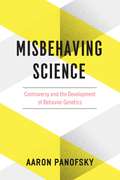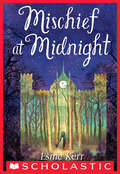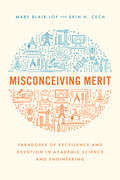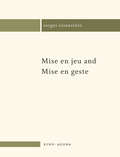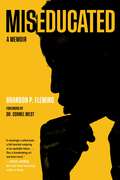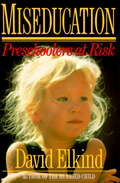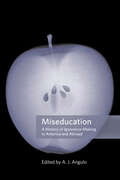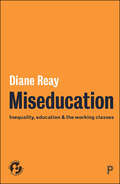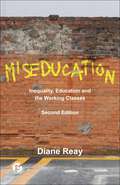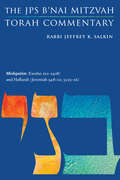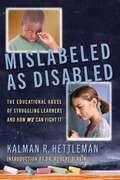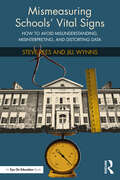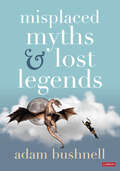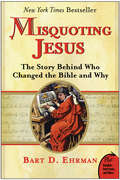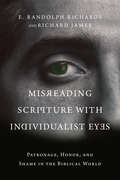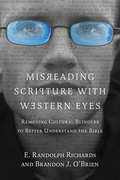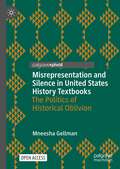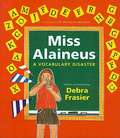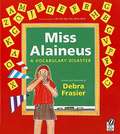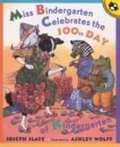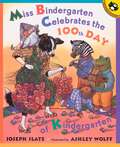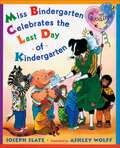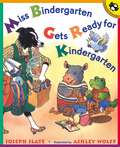- Table View
- List View
Misbehaving Science: Controversy and the Development of Behavior Genetics
by Aaron PanofskyBehavior genetics has always been a breeding ground for controversies. From the “criminal chromosome” to the “gay gene,” claims about the influence of genes like these have led to often vitriolic national debates about race, class, and inequality. Many behavior geneticists have encountered accusations of racism and have had their scientific authority and credibility questioned, ruining reputations, and threatening their access to coveted resources. In Misbehaving Science, Aaron Panofsky traces the field of behavior genetics back to its origins in the 1950s, telling the story through close looks at five major controversies. In the process, Panofsky argues that persistent, ungovernable controversy in behavior genetics is due to the broken hierarchies within the field. All authority and scientific norms are questioned, while the absence of unanimously accepted methods and theories leaves a foundationless field, where disorder is ongoing. Critics charge behavior geneticists with political motivations; champions say they merely follow the data where they lead. But Panofsky shows how pragmatic coping with repeated controversies drives their scientific actions. Ironically, behavior geneticists’ struggles for scientific authority and efforts to deal with the threats to their legitimacy and autonomy have made controversy inevitable—and in some ways essential—to the study of behavior genetics.
Mischief at Midnight (Knight's Haddon Ser. #2)
by Esme KerrThe thrilling follow-up to boarding school mystery The Girl with the Glass Bird.Best friends... for never?Anastasia Stolonov and Edie Wilson are back at boarding school after spending the summer apart, and they can't wait to be dormmates again! Unfortunately, things don't go as planned, and Edie is stuck with Janet, the new girl at Knight's Haddon. Janet isn't like anyone the other girls have ever met before. She's cool, confident, and a little rebellious, so Edie is thrilled that Janet seems to like her. And as Edie's friendship with Anastasia becomes rocky, Janet is the only one on Edie's side. But when mysterious things begin to happen, Edie starts to think that Janet may not be all she seems--and suddenly events take a dangerous turn. Will Edie be able to salvage her friendships and uncover what's going on before the clock runs out?
Misconceiving Merit: Paradoxes of Excellence and Devotion in Academic Science and Engineering
by Mary Blair-Loy Erin A. CechAn incisive study showing how cultural ideas of merit in academic science produce unfair and unequal outcomes. In Misconceiving Merit, sociologists Mary Blair-Loy and Erin A. Cech uncover the cultural foundations of a paradox. On one hand, academic science, engineering, and math revere meritocracy, a system that recognizes and rewards those with the greatest talent and dedication. At the same time, women and some racial and sexual minorities remain underrepresented and often feel unwelcome and devalued in STEM. How can academic science, which so highly values meritocracy and objectivity, produce these unequal outcomes? Blair-Loy and Cech studied more than five hundred STEM professors at a top research university to reveal how unequal and unfair outcomes can emerge alongside commitments to objectivity and excellence. The authors find that academic STEM harbors dominant cultural beliefs that not only perpetuate the mistreatment of scientists from underrepresented groups but hinder innovation. Underrepresented groups are often seen as less fully embodying merit compared to equally productive white and Asian heterosexual men, and the negative consequences of this misjudgment persist regardless of professors’ actual academic productivity. Misconceiving Merit is filled with insights for higher education administrators working toward greater equity as well as for scientists and engineers striving to change entrenched patterns of inequality in STEM.
Mise en jeu and Mise en geste
by Sergei EisensteinMise en jeu and Mise en geste was composed in January 1948, a few months before Sergei Eisenstein's untimely death. Here Eisenstein insists on subordinating all aspects of mise en scène to some unifying idea or principle inherent in the subject matter, transforming it from an incoherent jumble of staging decisions into a "legible text," wherein the subtext of a given scene or event – its hidden meaning – may be writ large. Unlike Eisenstein's previous writings on mise en scène, this essay treats separately distinct elements of that notoriously catch-all category: mise en jeu (transposition "of the interplay of motives" into a sequence of concrete actions); mise en geste (transposition of character into gesture); and mise en cadre (recreating the specific effects of a poetic passage through shot composition). Unfinished at the time of his death, the essay has been reconstructed by the Eisenstein Centre in Moscow and is appearing here in English for the first time. "[Filming Balzac's Père Goriot] is just like declaiming verse. A little too much emphasis on the period of the rhythm, and the recitation turns into a lifeless mechanical drone. A touch too slack on rhythmic delivery, and the distinct cadence of verse disintegrates into the baffling formlessness of semi-prose. A little too much emphasis on the circle [formed by the characters], and the mise en scène starts to lean towards ballet and conventional theatre. A bit too careless with the geometric figure, and the clear, distinct, meaningful mise en scène is sucked into the swamp of formless naturalism." — Sergei Eisenstein
Miseducated: A Memoir
by Brandon P. FlemingAn inspiring memoir of one man&’s transformation from a delinquent, drug-dealing dropout to an award-winning Harvard educator through literature and debate—all by the age of twenty-seven.Brandon P. Fleming grew up in an abusive home and was shuffled through school, his passing grades a nod to his skill on the basketball court, not his presence in the classroom. He turned to the streets and drug deals by fourteen, saved only by the dream of basketball stardom. When he suffered a career-ending injury during his first semester at a Division I school, he dropped out of college, toiling on an assembly line, until depression drove him to the edge. Miraculously, his life was spared.Returning to college, Fleming was determined to reinvent himself as a scholar—to replace illiteracy with mastery over language, to go from being ignored and unseen to commanding attention. He immersed himself in the work of Black thinkers from the Harlem Renaissance to present day. Crucially, he found debate, which became the means by which he transformed his life and the tool he would use to transform the lives of others—teaching underserved kids to be intrusive in places that are not inclusive, eventually at Harvard University, where he would make champions and history.Through his personal narrative, readers witness Fleming&’s transformation, self-education, and how he takes what he learns about words and power to help others like himself. Miseducated is an honest memoir about resilience, visibility, role models, and overcoming all expectations.
Miseducation
by David ElkindDesigned to help parents avoid the miseducation of young children. Dr. Elkind shows us the very real difference between the mind of a pre-school child and that of a school age child.
Miseducation: A History of Ignorance-Making in America and Abroad
by A. J. AnguloA provocative collection that explores how intentional ignorance seeps into formal education.Honorable Mention for the PROSE Education Theory Award of the Association of American PublishersIgnorance, or the study of ignorance, is having a moment. Ignorance plays a powerful role in shaping public opinion, channeling our politics, and even directing scholarly research. The first collection of essays to grapple with the historical interplay between education and ignorance, Miseducation finds ignorance—and its social production through naïveté, passivity, and active agency—at the center of many pivotal historical developments. Ignorance allowed Americans to maintain the institution of slavery, Nazis to promote ideas of race that fomented genocide in the 1930s, and tobacco companies to downplay the dangers of cigarettes. Today, ignorance enables some to deny the fossil record and others to ignore climate science. A. J. Angulo brings together seventeen experts from across the scholarly spectrum to explore how intentional ignorance seeps into formal education. Each chapter identifies education as a critical site for advancing our still-limited understanding of what exactly ignorance is, where it comes from, and how it is diffused, maintained, and regulated in society.Miseducation also challenges the notion that schools are, ideally, unimpeachable sites of knowledge production, access, and equity. By investigating how laws, myths, national aspirations, and global relations have recast and, at times, distorted the key purposes of education, this pathbreaking book sheds light on the role of ignorance in shaping ideas, public opinion, and policy.
Miseducation: Inequality, Education and the Working Classes (21st Century Standpoints)
by Diane ReayIn this book Diane Reay, herself working class turned Cambridge professor, brings Brian Jackson and Dennis Marsden’s pioneering Education and the Working Class from 1962 up to date for the 21st century.Drawing on over 500 interviews, the book, part of the 21st Century Standpoints series published in association with the British Sociological Association, includes rich, vivid stories from working class children and young people. It looks at class identity, the inadequate sticking plaster of social mobility, and the effects of wider economic and social class relationships on working class educational experiences.The book addresses the urgent question of why the working classes are still faring so much worse than the upper and middle classes in education. It reveals how we have ended up with an educational system that still educates the different social classes in fundamentally different ways, and vitally – what we can do to achieve a fairer system.
Miseducation: Inequality, Education and the Working Classes (21st Century Standpoints)
by Diane ReayEducation is supposed to level the playing field, and yet for many working-class children inequalities in the classroom in fact deepen the divide. Students from disadvantaged backgrounds are almost four times more likely to be excluded from school than their wealthier peers and many are struggling in an educational environment increasingly concerned with discipline. In this substantially revised and updated edition of her bestselling book, Diane Reay – herself working class turned Cambridge professor – investigates why we educate social classes so differently. Drawing on extensive interviews with working class children and young people, Miseducation offers a sharp critique of how class identity, social mobility, and entrenched inequalities shape educational outcomes. It also examines the increasing focus on control and discipline in UK schools and charts the impact of policies like academies on working-class students. In a new chapter, Reay draws lessons from educational systems around the world, while a second presents clear recommendations for creating a system that supports every child’s potential. Insightful and thought-provoking, this book is essential reading for anyone invested in the future of education and social equity.
Mishpatim: The JPS B'nai Mitzvah Torah Commentary (JPS Study Bible)
by Rabbi Jeffrey K. SalkinMishpatim (Exodus 21:1-24:18) and Haftarah (Jeremiah 34:8-22; 33:25-26): The JPS B’nai Mitzvah Torah Commentary shows teens in their own language how Torah addresses the issues in their world. The conversational tone is inviting and dignified, concise and substantial, direct and informative. Each pamphlet includes a general introduction, two model divrei Torah on the weekly Torah portion, and one model davar Torah on the weekly Haftarah portion. Jewish learning—for young people and adults—will never be the same. The complete set of weekly portions is available in Rabbi Jeffrey K. Salkin’s book The JPS B’nai Mitzvah Torah Commentary (JPS, 2017).
Mislabeled as Disabled: The Educational Abuse of Struggling Learners and How WE Can Fight It
by Kalman R. HettlemanKalman R. &“Buzzy&” Hettleman exposes the educational abuse suffered by tens of millions of struggling learners, including many who are &“Mislabeled as Disabled&” and dumped into special education. The majority of these students are not disabled in any medical or other clinical sense. Rather, in violation of federal law, they fail to receive proper instruction and fall farther behind, suffering stigma and segregation. Hettleman also shows how teachers are undervalued heroes denied the teaching tools to do the job right and, like students, are victimized by the system. This book is a call to everyone to become enraged, and then engaged in the struggle for reform.
Mismeasuring Schools’ Vital Signs: How to Avoid Misunderstanding, Misinterpreting, and Distorting Data
by Steve Rees Jill WynnsThis book helps school and district leaders avoid the pitfalls that await those making sense of their school’s data. Whether you're interpreting achievement gaps, graduation rates or test results, you're at risk of reaching a mistaken judgment. By learning about common errors and how they’re made, you'll be ready to choose safer, surer paths to making better sense of the wealth of data in your school or district. The authors help educators build better evidence, see conclusions more clearly, and explain the data more persuasively. Special features Include: "Questions to Spark Discussion" in each chapter encourage school site, district leaders, and board trustees to apply each chapter’s content to their own situations. Data visualizations, together with the authors’ interpretations, will help you learn how to do visual analysis (and reach the right conclusions). Practical tips provide clear guidance. Supplemental resources can be found at the book’s website, k12measures.com, including interactive data visualizations and analytic exercises to help you learn a concept by "doing."
Misplaced Myths and Lost Legends: Model texts and teaching activities for primary writing
by Adam BushnellBring myths and legends alive in your classroom. *20 myths and legends from across the UK are presented here as model texts for teaching writing in Key Stages 1 and 2; *Teaching ideas and activities are included in all chapters alongside writing tasks for your class, based on parts of the stories; *The activities support children to bring their own voices alive through their writing; *They are encouraged to imagine characters, create settings, develop storylines and weave themes and challenges into their narratives. A ′how to′ guide for teaching children in primary schools to write their own myths and legends.
Misplaced Myths and Lost Legends: Model texts and teaching activities for primary writing
by Adam BushnellBring myths and legends alive in your classroom. *20 myths and legends from across the UK are presented here as model texts for teaching writing in Key Stages 1 and 2; *Teaching ideas and activities are included in all chapters alongside writing tasks for your class, based on parts of the stories; *The activities support children to bring their own voices alive through their writing; *They are encouraged to imagine characters, create settings, develop storylines and weave themes and challenges into their narratives. A ′how to′ guide for teaching children in primary schools to write their own myths and legends.
Misquoting Jesus: The Story Behind Who Changed the Bible and Why
by Bart D. EhrmanWhen world-class biblical scholar Bart Ehrman first began to study the texts of the Bible in their original languages he was startled to discover the multitude of mistakes and intentional alterations that had been made by earlier translators. In Misquoting Jesus, Ehrman tells the story behind the mistakes and changes that ancient scribes made to the New Testament and shows the great impact they had upon the Bible we use today. He frames his account with personal reflections on how his study of the Greek manuscripts made him abandon his once ultraconservative views of the Bible.Since the advent of the printing press and the accurate reproduction of texts, most people have assumed that when they read the New Testament they are reading an exact copy of Jesus's words or Saint Paul's writings. And yet, for almost fifteen hundred years these manuscripts were hand copied by scribes who were deeply influenced by the cultural, theological, and political disputes of their day. Both mistakes and intentional changes abound in the surviving manuscripts, making the original words difficult to reconstruct. For the first time, Ehrman reveals where and why these changes were made and how scholars go about reconstructing the original words of the New Testament as closely as possible.Ehrman makes the provocative case that many of our cherished biblical stories and widely held beliefs concerning the divinity of Jesus, the Trinity, and the divine origins of the Bible itself stem from both intentional and accidental alterations by scribes -- alterations that dramatically affected all subsequent versions of the Bible.
Misreading Law, Misreading Democracy
by Victoria NourseVictoria Nourse argues that lawyers must be educated on the basic procedures that define how Congress operates today. Lawmaking creates winners and losers. If lawyers and judges do not understand this, they may embrace the meanings of those who opposed legislation, turning legislative losers into judicial winners and standing democracy on its head.
Misreading Scripture with Individualist Eyes: Patronage, Honor, and Shame in the Biblical World
by Richard James E. Randolph RichardsThe Bible was written within collectivist cultures. When Westerners, immersed in individualism, read the Bible, it's easy to misinterpret important elements—or miss them altogether. In any culture, the most important things usually go without being said. So to read Scripture well we benefit when we uncover the unspoken social structures and values of its world. We need to recalibrate our vision. Combining the expertise of a biblical scholar and a missionary practitioner, Misreading Scripture with Individualist Eyes is an essential guidebook to the cultural background of the Bible and how it should inform our reading. E. Randolph Richards and Richard James explore deep social structures of the ancient Mediterranean—kinship, patronage, and brokerage—along with their key social tools—honor, shame, and boundaries—that the biblical authors lived in and lie below the surface of each text. From Abraham, Sarah, and Hagar to Peter's instructions to elders, the authors strip away individualist assumptions and bring the world of the biblical writers to life. Expanding on the popular Misreading Scripture with Western Eyes, this book makes clear how understanding collectivism will help us better understand the Bible, which in turn will help us live more faithfully in an increasingly globalized world.
Misreading Scripture with Western Eyes: Removing Cultural Blinders to Better Understand the Bible
by E. Randolph Richards Brandon J. O'BrieneconomicSome readers might assume that Moses married "below himself" because his wife was a dark-skinned Cushite. Actually, Hebrews were the slave race, not the Cushites, who were highly respected. Aaron and Miriam probably thought Moses was being presumptuous by marrying "above himself."Western individualism leads us to assume that Mary and Joseph traveled alone to Bethlehem. What went without saying was that they were likely accompanied by a large entourage of extended family.
Misrepresentation and Silence in United States History Textbooks: The Politics of Historical Oblivion (Palgrave Studies in Educational Media)
by Mneesha GellmanThis open access book investigates how representation of Native Americans and Mexican-origin im/migrants takes place in high school history textbooks. Manually analyzing text and images in United States textbooks from the 1950s to 2022, the book documents stories of White victory and domination over Black, Indigenous, and People of Color (BIPOC) groups that disproportionately fill educational curricula. While representation and accurate information of non-White perspectives improves over time, the same limited tropes tend to be recycled from one textbook to the next. Textual analysis is augmented by focus groups and interviews with BIPOC students in California high schools. Together, the data show how misrepresentation and absence of BIPOC perspectives in textbooks impact youth identity. This book argues for an innovative rethinking of US history curricula to consider which stories are told, and which perspectives are represented.
Miss Alaineus: A Vocabulary Disaster
by Debra FrasierSage has misheard and misunderstood one of Mrs. Page's weekly vocabulary words. Her error leads to a humbling catastrophe: "a momentous tragedy," in front of the entire class. Can Sage turn her vocabulary disaster: "an event bringing great misfortune," into a triumph: "a true success?"
Miss Alaineus: A Vocabulary Disaster (Into Reading, Trade Book #6)
by Debra FrasierNIMAC-sourced textbook <p><p> Sage has misheard and misunderstood one of Mrs. Page's weekly vocabulary words. Her error leads to a humbling catastrophe: a momentous tragedy, in front of the entire class. Can Sage turn her vocabulary disaster: an event bringing great misfortune, into a triumph: a true success? Anyone who has ever been daunted: discouraged or disheartened, by a mere word in the dictionary will cheer wildly: in a manner lacking all restraint, as Sage transforms embarrassment into victory in Debra Frasier's touching story of loving--and mistaking--our glorious language.
Miss Bindergarten Celebrates the 100th Day (Miss Bindergarten)
by Joseph SlateMiss Bindergarten, the world's best kindergarten teacher, is getting ready for another milestone. Tomorrow she and her class will have been together for 100 days. To celebrate, each student must bring "100 of some wonderful, one-hundred-full thing!" At night, while the students go to work assembling their projects, Miss Bindergarten is working, too, making special surprises for the class. The 100th day of kindergarten is bound to be unforgettable! Children will delight in hearing about this special event, a common cause for celebration in kindergartens today.
Miss Bindergarten Celebrates the 100th Day of Kindergarten
by Joseph SlateMiss Bindergarten, the world's best kindergarten teacher, is getting ready for another milestone. Tomorrow she and her class will have been together for 100 days. To celebrate, each student must bring "100 of some wonderful, one-hundred-full thing!" At night, while the students go to work assembling their projects, Miss Bindergarten is working, too, making special surprises for the class. The 100th day of kindergarten is bound to be unforgettable! Children will delight in hearing about this special event, a common cause for celebration in kindergartens today.Illustrated by Ashley Wolff.
Miss Bindergarten Celebrates the Last Day of Kindergarten
by Joseph SlateMiss Bindergarten and her class have had a great year in kindergarten! They have gone on a field trip, marked the 100th day, created a circus, and even survived a wild day. But now the school year is over, and it's time to remember, to celebrate, and for Miss Bindergarten to say, Good-bye, kindergarten. It's been a special year.? The bestselling Miss Bindergarten series comes to a sweet and jubilant conclusion by honoring an important passage: the last day of kindergarten. Filled with last-day classroom ideas, it's also a perfect gift to honor graduation and moving-up ceremonies. Miss Bindergarten Celebrates the Last Day of Kindergarten is the perfect way for teachers and students to commemorate their own end-of-the-year festivities.
Miss Bindergarten Gets Ready for Kindergarten
by Joseph SlateThis rhyming, brightly illustrated book is the perfect way to practice the alphabet and to introduce young children to kindergarten.It's the first day of kindergarten and Miss Bindergarten is hard at work getting the classroom ready for her twenty-six new students. Meanwhile, Adam Krupp wakes up, Brenda Heath brushes her teeth, and Christopher Beaker finds his sneaker. Miss Bindergarten puts the finishing touches on the room just in time, and the students arrive. Now the fun can begin! "Multifaceted and appealing, this book can be enjoyed in many ways, at home and at school." --The New York Times Book ReviewFor readers of Kindergarten, Here I Come and The Night Before Kindergarten.
